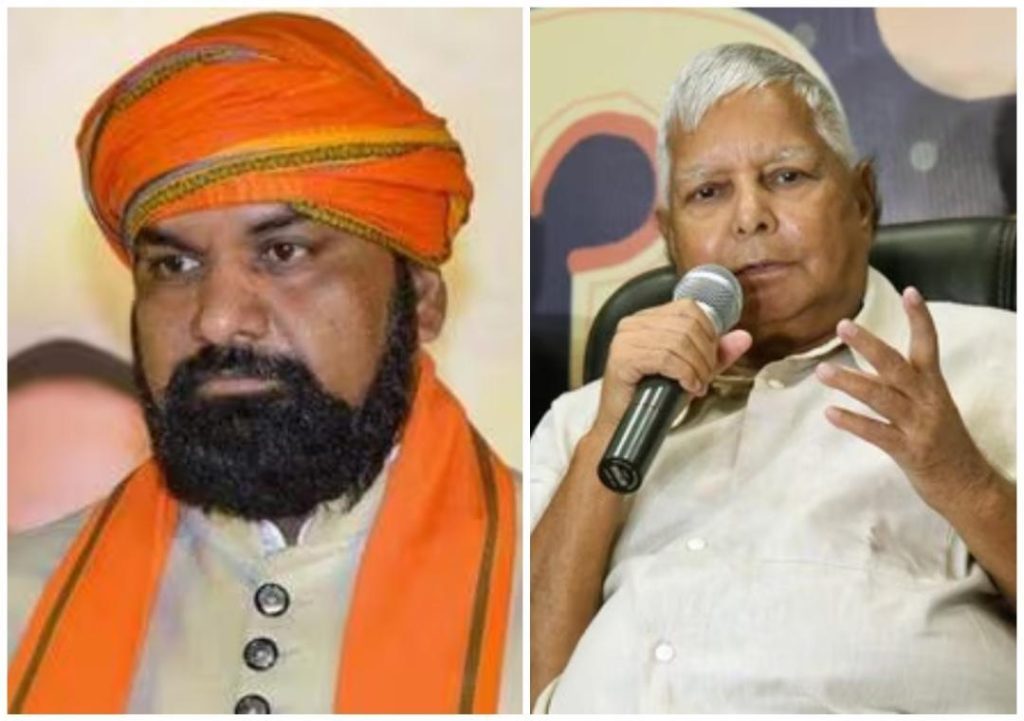
Lalu is the ‘Gabbar’ of Bihar, he scares everyone: Bihar Dy CM
As the assembly elections in Bihar are just around the corner, the political atmosphere is heating up, with parties trying to woo voters with their promises and slogans. However, in a recent statement, Bihar Deputy Chief Minister Samrat Choudhary has sparked a controversy by calling RJD chief Lalu Prasad Yadav the “Gabbar” of Bihar, alleging that his fear had driven away over 1.25 crore people from the state.
Choudhary’s statement has left many wondering about the nature of the fear that Lalu Prasad Yadav commands. What exactly does he mean by “Gabbar” and how did Lalu’s fear impact the people of Bihar? In this blog post, we will delve deeper into the context of Choudhary’s statement and analyze its implications on the upcoming elections.
For the uninitiated, “Gabbar” is a popular Bollywood character from the iconic film Sholay, played by Amjad Khan. He is a ruthless dacoit who strikes fear in the hearts of everyone in the village, and his name has since become synonymous with intimidation and fear.
According to Choudhary, under Lalu Prasad Yadav’s rule, people in Bihar were living in constant fear. He alleged that the RJD chief’s fear was so pervasive that it led to a massive exodus of over 1.25 crore people from the state. This is a staggering number, and it’s hard to imagine what kind of climate of fear would drive people to leave their homes and families behind.
Choudhary’s statement is a scathing attack on Lalu Prasad Yadav’s leadership, and it’s clear that the Bihar Deputy Chief Minister is trying to capitalize on the fear that Lalu’s rule inspired in people. However, it’s also important to consider the context in which this fear was spread.
Lalu Prasad Yadav has been accused of nepotism, corruption, and cronyism during his tenure as the Chief Minister of Bihar. His family members, including his children and in-laws, were given prominent positions in government and public sector enterprises, leading to widespread allegations of favoritism and abuse of power.
Moreover, Lalu’s rule was also marked by violence and intimidation, with many opposition leaders and workers being targeted by the ruling party’s goons. This created a climate of fear, where people were too afraid to speak out against the government or question its decisions.
It’s also worth noting that Lalu Prasad Yadav’s fear was not limited to any particular community or class. He was accused of using his political power to intimidate and silence anyone who opposed him, including upper caste Hindus, backwards, and even his own party members.
Choudhary’s statement is a clear attempt to tap into this collective fear and use it to his advantage in the upcoming elections. By branding Lalu as the “Gabbar” of Bihar, he is trying to convey a sense of relief and freedom that the people of Bihar will experience once he is gone.
However, it’s also important to recognize that Lalu Prasad Yadav’s fear was not limited to his personal actions alone. His fear was also perpetuated by the systemic corruption and patronage that characterized his rule, as well as the lack of accountability and transparency that led to his downfall.
As the assembly elections in Bihar approach, Choudhary’s statement is likely to be seen as a clever political move to discredit Lalu and his party. However, it’s also important to remember that the people of Bihar have suffered enough under Lalu’s rule, and they deserve a government that is transparent, accountable, and committed to their well-being.
In conclusion, Choudhary’s statement is a clear attempt to tap into the collective fear that Lalu Prasad Yadav inspired in people during his tenure as the Chief Minister of Bihar. While it’s true that Lalu’s rule was marked by fear and intimidation, it’s also important to recognize that his fear was perpetuated by the systemic corruption and patronage that characterized his rule.
As the people of Bihar prepare to cast their votes in the upcoming assembly elections, they would do well to remember the lessons of the past and not be swayed by empty rhetoric and political posturing. They deserve a government that is committed to their well-being, and not one that is driven by personal ambition and political opportunism.






